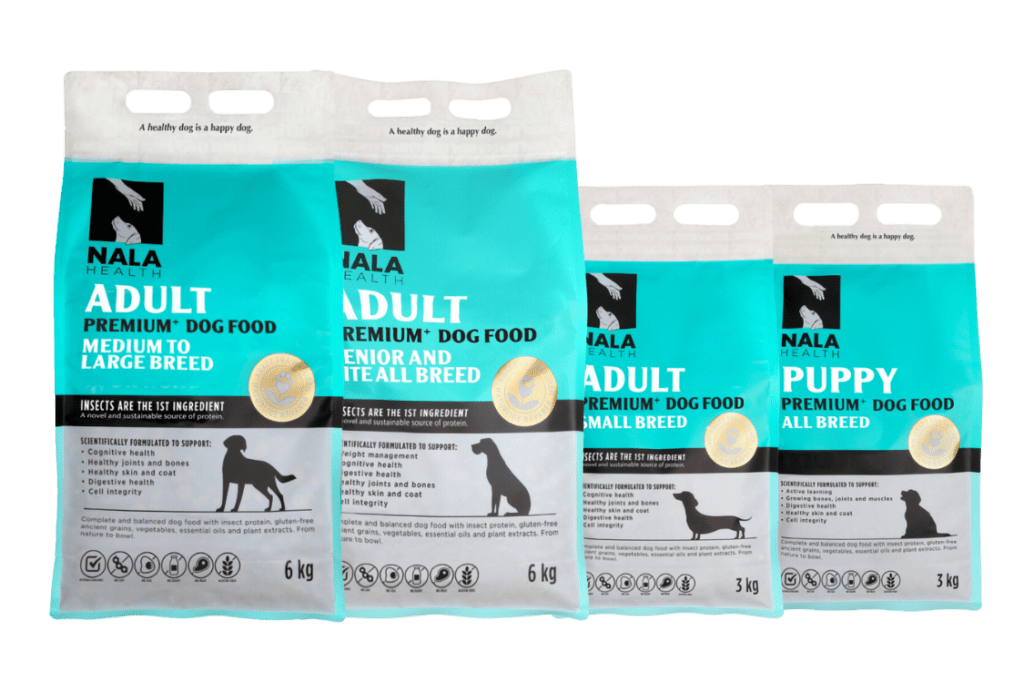Zaffi’s Journey With Pancreatitis and IBD
 Cecilie Hemsen Berg
Cecilie Hemsen Berg
Zaffi, a kind-natured dog found his forever home in 2017 when Bernhard Weiss adopted him from a local shelter. Describing their first meeting, Bernhard recalls, “Zaffi was returning from an outing, looking a bit scrawny and nervous. His caretaker called him ‘Baby Butch,’ her favourite among the dogs. It was tough choosing just one, but Zaffi made the decision easy.” From their first eye contact, a bond was formed, leading Bernhard to welcome Zaffi into his family, knowing well the challenges that lay ahead.
Zaffi’s Health Challenges: IBD and Pancreatitis
Soon after his adoption, Zaffi was diagnosed with Inflammatory Bowel Disease (IBD) and pancreatitis, conditions that made his integration into a calm domestic life initially difficult. Bernhard embarked on a mission to find a suitable treatment to provide Zaffi with relief and a better quality of life.

Inflammatory bowel disease (IBD) causes inflammation in your dog’s gastrointestinal (GI) tract, where much of their immune system is located. This can lead to overall health issues. Symptoms like vomiting, diarrhoea, reduced appetite, weight loss, gas, stomach pain, and occasionally red, itchy ears and skin reactions can appear and may come and go. Due to the inflammation, the body will also struggle to absorb nutrients.
Pancreatitis is also an inflammatory condition, causing abdominal pain, vomiting, and lethargy. There are two types of pancreatitis: acute, which needs immediate vet care, and chronic, which develops slowly and requires ongoing management.
As Bernhard soon discovered, both conditions can be managed with a healthy diet in addition to medication. In general, a healthy diet for dogs with IBD and pancreatitis consists of highly digestible, low-fat foods that are easy on the stomach. It’s important to avoid common allergens and inflammatory ingredients, focusing on novel proteins and carbohydrates that are less likely to cause reactions. Ingredients (or supplements) like DHA omega-3 fatty acids, probiotics, butyrate and soluble fibre can also support digestive health and reduce inflammation.
Choosing Nala Health: A Turning Point
Treating IBD and pancreatitis often requires a multifaceted approach. A combination of an appropriate diet, medicines and follow-ups with your vet may be necessary.
After doing extensive research Bernhard came across Nala Health and wanted to give it a try for Zaffi. Nala Health’s senior recipe contains a novel protein, is lower in fat and is easily digestible, all of which can be beneficial for dogs with IBD and pancreatitis. “Selecting dog food for my pets must meet critical criteria: the health of my dogs, environmental impact, animal welfare, and of course, cost,” Bernhard explains.
Nala Health’s dog food incorporates protein from black soldier fly larvae, omega-3 fatty acids, gluten-free ancient grains and prebiotic fibre. These ingredients can aid in improving gut health and reduce inflammation, both of which are beneficial for managing IBD and pancreatitis. The addition of antioxidants from botanicals such as rooibos, rosemary, cinnamon and capsicum is also beneficial for inflammation.

Symptoms of IBD
In addition to good food, some help from his skilled vet and his medication, Zaffi has seen a quick turnaround. The results speak for themselves. Today, Zaffi is not just surviving; he’s thriving. His condition has improved significantly, and he leads a joyful, active life. “Zaffi has never been more stably healthy,” shares a relieved Bernhard.
Inflammatory Bowel Disease (IBD) in dogs manifests with a variety of symptoms that can vary in severity and frequency. Some of the most common symptoms include:
- Chronic Diarrhoea and/or Frequent Bowel movements: Persistent or recurrent diarrhoea is one of the hallmark signs of IBD. It may contain mucus or blood and can vary in consistency. Your dog may also attempt to defecate more often than normal, sometimes with little stool produced.
- Vomiting: Frequent vomiting is another common symptom, which can occur with or without the presence of food.
- Weight Loss: Despite a normal or increased appetite, affected dogs often experience weight loss, which can be significant over time.
- Decreased Appetite: Some dogs might show less interest in food or become pickier eaters.
- Abdominal Pain: The dog may exhibit signs of discomfort or pain in the abdomen. This can include whimpering, groaning, or reacting negatively to touch.
- Lethargy: A general decrease in energy levels and activity can be observed, with dogs often appearing tired or uninterested in usual activities.
- Flatulence: Increased gas production can be another symptom, often accompanied by a rumbly abdomen.
- Poor Coat Quality: The overall condition of the dog’s coat may deteriorate, becoming dull and lifeless, which reflects poor nutrition absorption.
- Bloody Stools: In some cases, stools may have a tarry appearance or visible streaks of blood.


These symptoms are not exclusive to IBD and can be indicative of various other health issues, so it’s important for a veterinarian to perform a thorough examination and conduct appropriate tests to make an accurate diagnosis.
Diagnosing IBD
Inflammatory Bowel Disease (IBD) in dogs is diagnosed through a combination of clinical signs, veterinary evaluation, and specific diagnostic tests:
- Laboratory Tests: Initial laboratory tests may include a complete blood count, checking electrolyte levels and faecal examination.
- Imaging: X-rays and ultrasounds can be used to visualise the condition of the gastrointestinal tract. These can help to identify thickening of the intestinal walls, abnormal contents, or other changes associated with IBD.
- Exclusion of Other Diseases: Part of diagnosing IBD involves excluding other diseases that mimic its symptoms, such as lymphoma, systemic infections, or other specific gastrointestinal diseases.
IBD is considered a diagnosis of exclusion, meaning that it is diagnosed after ruling out other potential causes of the symptoms. Each dog’s diagnosis might require a slightly different approach depending on the severity of the symptoms and the presence of other health issues. Treatment typically involves dietary management, possibly including an elimination diet to identify food intolerances, and medication to control inflammation and support immune function.
Symptoms of Pancreatitis
Pancreatitis symptoms can be similar to those of IBD, however, your dog may also experience a fever, dehydration and sometimes abdominal enlargement. Being aware of these signs can help you seek timely veterinary care for your pet, as pancreatitis is a serious illness that can cause damage to other organs. The most common symptoms for pancreatitis are:


- Loss of appetite: The dog will often feel less hungry.
- Lack of energy/weakness: The dog will often appear tired or uninterested in usual activities.
- Repeated vomiting: The vomit might have a yellowish colour, and can contain undigested food.
- Diarrhoea: It may be watery and contain blood or yellowish mucus.
- Fever: Normal body temperature in dogs is between 38 and 39 degrees Celsius.
- Dehydration: Signs include panting, sunken eyes, dry nose, and thick spit.
- Abdominal pain: The belly might be bloated and hard. It can be difficult to understand if your dog is in pain, because it’s a dog’s instinct to mask or hide its pain. Your dog might be panthing, be restless and stand with a hunched back.
Diagnosing Pancreatitis in Dogs
Diagnosing pancreatitis in dogs also involves a combination of clinical examination, symptom review, and specific diagnostic tests:
- Blood Tests: One of the key diagnostic tools is a blood test that measures white blood cells or enzyme levels (amylase and lipase), which are often elevated in cases of pancreatitis. Another test is the Canine Pancreatic Lipase Immunoreactivity (cPLI) test, which is more specific to the pancreas and can confirm inflammation.
- Imaging: Ultrasound is particularly useful for visualising the pancreas and can help identify inflammation.
- Urinalysis: Testing the urine can also be done.
Accurate diagnosis is essential for the effective treatment and management of pancreatitis in dogs. Early detection and appropriate intervention can significantly improve the prognosis and help manage the symptoms more effectively.
The Importance of Diet in Managing Canine Health
An appropriate, healthy diet might significantly help in managing conditions like IBD and pancreatitis. The right nutritional approach can help alleviate symptoms, promote healing, and maintain overall gut health, making it an important aspect of ongoing care for dogs suffering from these conditions.
It is vital to consider that each dog’s needs may vary, and it’s important to work closely with a veterinarian to tailor the diet and medication specifically to your dog’s individual health requirements. Monitoring the dog’s response to dietary changes and adjusting the plan as needed are essential steps in managing both pancreatitis and IBD effectively.



Conclusion
Zaffi’s story is a testament to the transformative impact of comprehensive veterinary care and holistic nutritional support. Zaffi’s journey from a shelter dog with health issues to a beloved, healthy family member is not just inspiring—it’s a clear indicator of how the right support and care can change lives.

